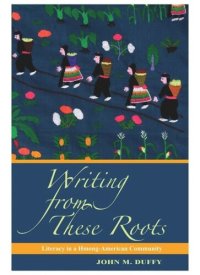
Ebook: Writing from These Roots: Literacy in a Hmong-American Community
Author: John M. Duffy
- Year: 2007
- Publisher: University of Hawaii Press
- Language: English
- pdf
Outstanding Book Award, Conference on College Composition and Communication
"We are only beginning to recognize the global forces that have long shaped literacy in the United States. What we need now is a book that demonstrates how to theorize U.S. literacy with regard to globalization’s complex legacy. Writing from These Roots satisfies this need, and then some. Duffy’s careful representation of Hmong literacy narratives is a remarkable accomplishment in its own right, not least for the respect he shows the women and men whose stories enable him to delineate personal, cultural, and national pathways to literacy. In also documenting Hmong people’s transnational pathway to literacy in the United States, Duffy expertly details the rhetorical means by which literacy can make legible the self-fashioning of distinct identities against a historical backdrop bleached by generations of assimilationist public policy and racist discourse. Duffy’s insistence that we think rhetorically about literacy is a call that will resonate in literacy scholarship for years to come." —Peter Mortensen, University of Illinois at Urbana-Champaign
"Writing from These Roots is without doubt a major, original, and important work. Fittingly, for a book that conceptualizes its topics and themes globally and comparatively, it will attract an international audience." —Harvey J. Graff, The Ohio State University
"This is a fascinating and important study that is rich in theoretical insight about literacy and has an informed and detailed account of the Hmong experience in Laos and the United States." —Franklin Ng, California State University, Fresno
Writing from These Roots documents the historical development of literacy in a Midwestern American community of Laotian Hmong, a people who came to the United States as refugees from the Vietnam War and whose language had no widely accepted written form until one created by missionary-linguists was adopted in the late twentieth century by Hmong in Laos and, later, the U.S. and other Western nations. As such, the Hmong have often been described as "preliterates," "nonliterates," or members of an "oral culture." Although such terms are problematic, it is nevertheless true that the majority of Hmong did not read or write in any language when they arrived in the U.S. For this reason, the Hmong provide a unique opportunity to study the forces that influence the development of reading and writing abilities in cultures in which writing is not widespread and to do so within the context of the political, economic, religious, military, and migratory upheavals classified broadly as "globalization."